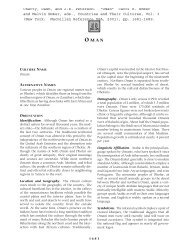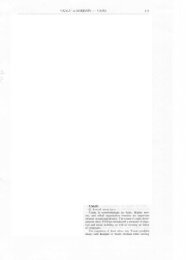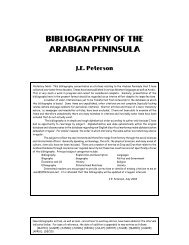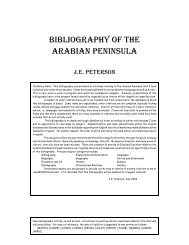THE ARABIAN PENINSULA IN MODERN TIMES: A - JEPeterson.net
THE ARABIAN PENINSULA IN MODERN TIMES: A - JEPeterson.net
THE ARABIAN PENINSULA IN MODERN TIMES: A - JEPeterson.net
Create successful ePaper yourself
Turn your PDF publications into a flip-book with our unique Google optimized e-Paper software.
een penned by Easa Saleh al‐Gurg, a prominent Dubai businessman and UAE ambassador to<br />
the United Kingdom. The study of established merchant families in the Gulf has been enhanced<br />
by a “biography” of Bahrain’s best known family by family member Khalid M. Kanoo and by<br />
James Onley’s articles on an earlier Perso‐Bahraini family. 30 In 1947, Imam Yahya took a radical<br />
step for Yemen and sent a small group of young men out of the country for education. These<br />
“Famous Forty” and the several hundred other Yemenis educated abroad until 1959 are the<br />
focus of Robert Burrowes’ article. Another rare autobiography has been published by Mohsin<br />
Alaini, a prime mover behind the fledgling Yemen Arab Republic as frequent prime minister and<br />
foreign minister, and translated into English. In counterpoint, a voice from Aden and the<br />
founder of South Yemen’s Communist Party, ‘Abdullah Ba Dhib, is discussed by A.K. al‐Ilbi. 31<br />
Westerners involved with Arabia have produced far more autobiographies and have been<br />
the subject of both casual and serious biographers. The substantial genre of travel writing,<br />
which revealed so many details of the lives of authors, has been largely superseded by<br />
guidebooks as mass tourism has entered the region. 32 Britain has had the most substantial and<br />
enduring relationship with Arabia and the Gulf of any Western power. Not only is there a long<br />
history of diplomatic ties with regional entities but the smaller Gulf states were British<br />
“protected states” as mentioned below. Consequently, British memoirs published in the last<br />
two decades have been written by Political Residents, Political Agents, and Resident Advisers in<br />
the Gulf and South Arabia. Through their pages, the reader can gain understanding of the<br />
transition from the Indian Political Service and from Sudan administration to the Gulf, which<br />
occurred in the decades prior to official British withdrawal from the Gulf in 1971.<br />
A number of these books were penned prior to 1990 but more recently Julian Walker has<br />
written of his time in the Gulf while Michael Crouch and Nigel Groom recount their experiences<br />
in British‐administered South Arabia. 33 Former Political Resident Bernard Burrows followed up<br />
an earlier chronicle of his time in the Gulf with a more general autobiography of his diplomatic<br />
30. Easa Saleh al-Gurg, The Wells of Memory: An Autobiography (London: John Murray, 1998); Khalid M.<br />
Kanoo, The House of Kanoo: A Century of an Arabian Business (London: I.B. Tauris, 1998); James Onley,<br />
“Transnational Merchants in the Ni<strong>net</strong>eenth Century Gulf: The Case of the Safar Family,” in Madawi Al-Rasheed,<br />
ed., Transnational Connections and the Arab Gulf (London: RoutledgeCurzon, 2005), pp. 59-89; and ibid.,<br />
“Transnational Merchant Families in the Ni<strong>net</strong>eenth and Twentieth Century Gulf,” in Alanoud Alsharekh, ed., The<br />
Gulf Family: Kinship Policies and Modernity (London: Saqi, 2007), pp. 37-56.<br />
31. A.K. al-Ilbi, “L’apport de Abd Allah Badhiub (1931-1976) à l’analyse de la formation socio-economique du<br />
Yemen,” Cahiers du GREMAMO, Vol. 10 (1991), pp. 171-178; Robert D. Burrowes, “The Famous Forty and Their<br />
Companions: North Yemen’s First-Generation Modernists and Educational Emigrants,” Middle East Journal, Vol.<br />
59, No. 1 (Winter 2005), pp. 81-97; Mohsin A. Alaini, 50 Years in Shifting Sands: Personal Experience in the<br />
Building of a Modern State in Yemen (translated by Hassan al-Haifi; Beirut: Dar An-Nahar, 2004).<br />
32. Fortunately, that effective demise of exploratory travel writing has not put an end to writing about travelers:<br />
Michael, Wolfe, ed., One Thousand Roads to Mecca: Ten Centuries of Travelers Writing About the Muslim<br />
Pilgrimage (New York: Grove, 1997); Terence Clark, “The British in Oman Since 1645,” in Paul and Ja<strong>net</strong><br />
Starkey, Unfolding the Orient: Travellers in Egypt and the Near East (Reading: Ithaca Press, 2002); Hilal Al-Hajri,<br />
“British Travellers in Oman from 1627 to 1970,” in Andrzej Kapiszewski, Abdulrahman alSalimi, and Andrzej<br />
Pikulski, eds., Modern Oman: Studies on Politics, Economy, Environment, and Culture of the Sultanate (Krakow:<br />
Ksiegarnia Akademicka, 2006), pp. 63-88.<br />
33. Michael Crouch, An Element of Luck: To South Arabia and Beyond (London: Radcliffe Press, 1993); Julian<br />
Walker, Tyro on the Trucial Coast (Durham, UK: Memoir Club, 1999); Nigel Groom, Sheba Revealed: A Posting<br />
to Bayhan in the Yemen (London: London Centre of Arab Studies, 2002).<br />
10







